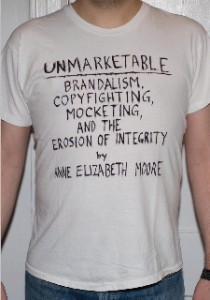Image credit: Anne Elizabeth Moore, cover for "Unmarketable," pub. The New Press, Fall 2007
--------------------------------
I think, too, I’ve not only gotten extremely depressed by the heteronormative and tiny independent publishing scene in the US, but I’ve gotten bored with how media operates. A stressed out country does not read, and they certainly do not react to what they read about with action. Don’t get me wrong: the destruction of the independent publishing scene goes against the founding principles of this country. The loss of sustained independent bodies of reporting has directly contributed to the tracking and cessation of further violations of civil and human rights in the US, not to mention allowed for unchecked limits to freedoms in academia and elsewhere. But I’ve also really enjoyed moving away from the idea that journalism is the only solution. Smart people can get the same information from different sources.
- AEM
Because copyright doesn’t actually cover all matters of intellectual property rights: there are a ton of things that we do, make, use, and create that we don’t bother to assign copyright to. Cooking, for example, and quilting and knitting and sewing. Traditionally known as women’s work. Most of this isn’t eligible for copyright because, in the theory that went into creating the law, they worked from the accrued common knowledge of a group of people and result in products that are intended for private consumption. So: the law is publicly acknowledging that some work traditionally identified as feminine doesn’t matter in terms of this law, which after all is about the right to have ownership over, but also profit from, your own work. This is therefore a law that is fundamentally flawed, in several different arenas. Fighting it on its own terms isn’t going to change the basis of our understanding about the kinds of work that matters and the kinds of work that don’t.
- AEM




No comments:
Post a Comment